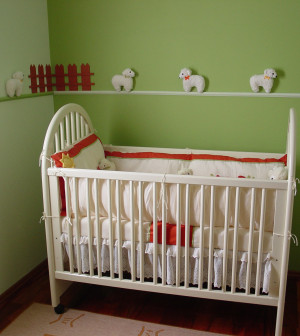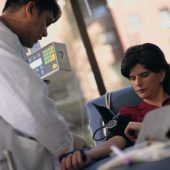- 8 Ways to Increase Dopamine Naturally
- 7 Best Breads for Maintaining Stable Blood Sugar
- Gelatin vs. Collagen: Which is Best for Skin, Nails, and Joints?
- The Long-Term Effects of Daily Turmeric Supplements on Liver Health
- Could Your Grocery Store Meat Be Causing Recurring UTIs?
- Are You Making This Expensive Thermostat Error This Winter?
- Recognizing the Signs of Hypothyroidism
- 10 Strategies to Overcome Insomnia
- Could Artificial Sweeteners Be Aging the Brain Faster?
- Techniques for Soothing Your Nervous System
Bad Night’s Sleep May Raise Blood Pressure in Kids


Kids who don’t get enough sleep at night may experience a slight spike in their blood pressure the next day even if they are not overweight or obese, a new study suggests.
The research included 143 kids aged 10 to 18 who spent one night in a sleep lab for observation. They also wore a 24-hour blood pressure monitor and kept a seven-day sleep diary.
The participants were all normal weight. None had significant sleep apnea — a condition characterized by disrupted breathing during sleep. The sleep disorder has been linked to high blood pressure.
According to the findings, just one less hour of sleep per night led to an increase of 2 millimeters of mercury (mm/Hg) in systolic blood pressure. That’s the top number in a blood pressure reading. It gauges the pressure of blood moving through arteries.
One less hour of nightly sleep also led to a 1 mm/Hg rise in diastolic blood pressure. That’s bottom number, which measures the resting pressure in the arteries between heart beats.
Catching up on sleep over the weekend can help improve blood pressure somewhat, but is not enough to reverse this effect entirely, report researchers led by Chun Ting Au, at the Chinese University of Hong Kong.
So, even though the overall effect of sleep loss on blood pressure was small, it could have implications for risk of heart disease in the future, they suggested.
Exactly how lost sleep leads to increases in blood pressure is not fully understood, but Au and colleagues speculate that it may give rise to increases in stress hormones, which are known to affect blood pressure. The findings are published online Dec. 16 and in the January print issue of Pediatrics.
Participants in the study slept anywhere from seven hours or less to more than 10 hours. The less sleep they got, the higher their blood pressure was the following day.
U.S. experts said the new findings emphasize the importance of good quality sleep for all kids.
“The study separates the effect of sleep apnea from sleep loss, and conclusively shows that sleep loss in the absence of sleep apnea raises both systolic and diastolic blood pressure,” said Dr. Sanjeev Kothare, a pediatric sleep expert at NYU Langone Medical Center, in New York City.
“Pediatricians must screen for diabetes, and [high blood pressure] in teenagers with sleep loss besides screening for snoring and sleep apnea in obese teenagers,” Kothare said.
According to the National Sleep Foundation, children aged 5 to 12 need 10 to 11 hours of sleep. Teens need about 9.25 hours of sleep each night to function best, but for some, 8.5 hours is enough.
“Being healthy is not only getting regular exercise and eating right, but also trying to get the appropriate amount of sleep,” said Dr. Rubin Cooper, chief of pediatric cardiology at Cohen Children’s Medical Center, in New Hyde Park, N.Y.
To encourage better sleep, “start a bedtime routine that helps your children wind down before bed and limit texting or social media at night,” Cooper said. “Keep a similar schedule on weekdays and weekends.” Other sleep hygiene tips include avoiding caffeine before bedtime.
These measures may be even more important among kids who are overweight and obese. “If you have kids who are staying up late and getting up early on top of obesity and sleep apnea, it is the perfect storm,” Cooper said. But exactly how big of a difference better sleep would make in this scenario is unknown, he noted.
Although the study found an association between kids getting less sleep and a slight increase in blood pressure, it did not establish a cause-and-effect relationship.
The bottom line is that “sleep isn’t optional for adolescents,” said Dr. Metee Comkornruecha, an adolescent medicine specialist at Miami Children’s Hospital.
More information
Find tips on improving sleep at the National Sleep Foundation.
Source: HealthDay
Copyright © 2026 HealthDay. All rights reserved.










